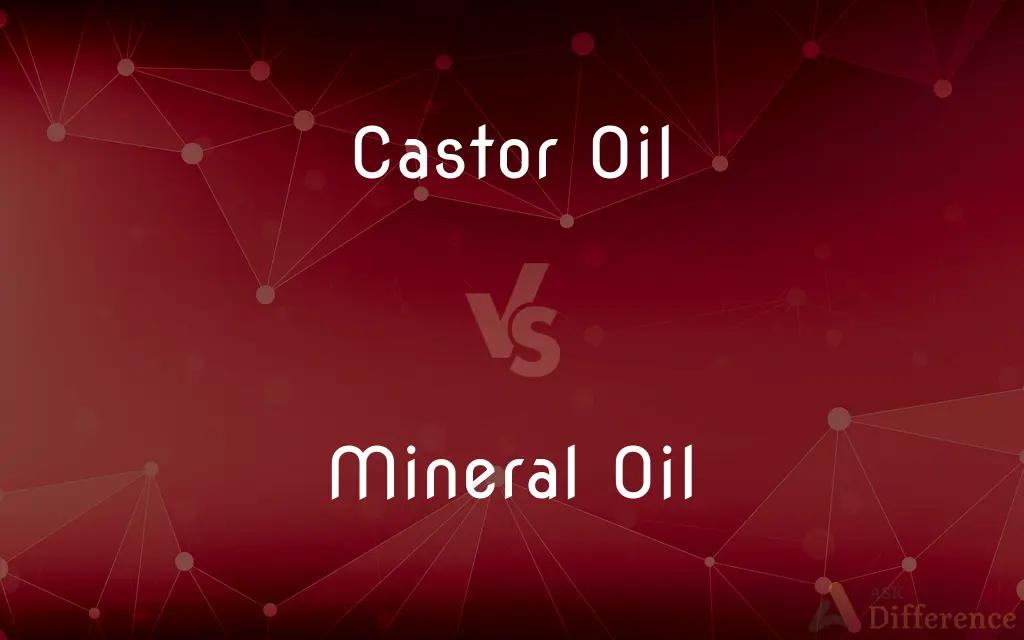Castor Oil vs. Mineral Oil — What's the Difference?
Edited by Tayyaba Rehman — By Fiza Rafique — Published on November 17, 2023
Castor Oil is a vegetable oil derived from the seeds of the castor plant, while Mineral Oil is a clear, odorless oil made from petroleum as a byproduct of refining crude oil.

Difference Between Castor Oil and Mineral Oil
Table of Contents
ADVERTISEMENT
Key Differences
Castor Oil is extracted from the seeds of the Ricinus communis plant, commonly known as the castor plant. In contrast, Mineral Oil is manufactured from petroleum and undergoes several refining processes to achieve its transparent and inert state.
From a medicinal perspective, Castor Oil has been historically used as a laxative and for various health remedies. Mineral Oil, meanwhile, is often utilized as a moisturizer and a gentle laxative, mainly because it doesn’t get absorbed by the body.
In cosmetic applications, Castor Oil is frequently found in hair and skincare products due to its moisturizing properties. Mineral Oil, on the other hand, is prevalent in various cosmetics because of its ability to prevent water loss from the skin.
Industrially, Castor Oil serves as a component in the manufacturing of soaps, lubricants, and paints. Mineral Oil, conversely, is used in a wide range of applications, including as a base for baby oils, ointments, and some mechanical lubricants.
When it comes to environmental concerns, Castor Oil is biodegradable and considered a renewable resource since it's plant-derived. Mineral Oil, being a petroleum derivative, raises more environmental considerations due to its non-biodegradable nature.
ADVERTISEMENT
Comparison Chart
Origin
Extracted from castor plant seeds.
Made from petroleum.
Common Uses
Laxatives, cosmetics, and industrial products.
Moisturizers, cosmetics, and some lubricants.
Absorption
Partially absorbed by the body.
Not absorbed; remains on the skin’s surface.
Environmental Concerns
Biodegradable and renewable.
Non-biodegradable and petroleum-based.
Physical Properties
Viscous with a distinct taste and odor.
Clear, odorless, and non-reactive.
Compare with Definitions
Castor Oil
Castor Oil serves as a component in various industrial applications.
The paint manufacturer incorporated Castor Oil for its binding properties.
Mineral Oil
Mineral Oil remains on the skin’s surface and isn’t absorbed.
After applying Mineral Oil, her skin felt soft without feeling greasy.
Castor Oil
Castor Oil has moisturizing properties beneficial for skin and hair.
Applying Castor Oil regularly improved the texture of her dry skin.
Mineral Oil
Mineral Oil is non-reactive, making it safe for many skin types.
Even with her sensitive skin, the Mineral Oil caused no irritation.
Castor Oil
Castor Oil is traditionally used for its laxative effects.
He took a teaspoon of Castor Oil to relieve his constipation.
Mineral Oil
Mineral Oil is a clear and odorless oil derived from petroleum.
She used Mineral Oil to remove her waterproof makeup.
Castor Oil
Castor Oil has a distinct taste and viscous consistency.
Due to its strong flavor, she mixed the Castor Oil with orange juice.
Mineral Oil
Mineral Oil acts as a barrier on the skin, preventing moisture loss.
To combat dryness, he applied Mineral Oil after his evening shower.
Castor Oil
Castor Oil is a vegetable oil pressed from castor seeds.
She added Castor Oil to her hair mask for extra moisture.
Mineral Oil
Mineral Oil is utilized in various cosmetic products and ointments.
The lotion contains Mineral Oil for its hydrating benefits.
Common Curiosities
Which oil is more environmentally friendly?
Castor Oil is considered more environmentally friendly since it's biodegradable and plant-derived.
What are the cosmetic uses of Mineral Oil?
Mineral Oil is found in lotions, creams, makeup removers, and baby oils.
What is Castor Oil made from?
Castor Oil is derived from the seeds of the Ricinus communis, or castor plant.
Can Castor Oil be used for hair growth?
Yes, many believe that Castor Oil can promote hair growth due to its ricinoleic acid content.
Can Mineral Oil be ingested?
In its food-grade form, Mineral Oil can be ingested and is sometimes used as a laxative.
How is Mineral Oil produced?
Mineral Oil is made from petroleum as a byproduct of refining crude oil.
Is Mineral Oil safe for skincare?
Yes, when properly refined, Mineral Oil is non-comedogenic and safe for most skin types.
What are the industrial applications of Castor Oil?
Castor Oil is used in the production of soaps, lubricants, and paints, among others.
Can Castor Oil be used on sensitive skin?
It's always best to do a patch test, but many find Castor Oil gentle enough for sensitive skin.
Is Mineral Oil natural?
While derived from natural petroleum, Mineral Oil undergoes significant refining, so it's considered semi-synthetic.
Share Your Discovery

Previous Comparison
Titanium Oxide vs. Titanium Dioxide
Next Comparison
Mission Statement vs. Vision StatementAuthor Spotlight
Written by
Fiza RafiqueFiza Rafique is a skilled content writer at AskDifference.com, where she meticulously refines and enhances written pieces. Drawing from her vast editorial expertise, Fiza ensures clarity, accuracy, and precision in every article. Passionate about language, she continually seeks to elevate the quality of content for readers worldwide.
Edited by
Tayyaba RehmanTayyaba Rehman is a distinguished writer, currently serving as a primary contributor to askdifference.com. As a researcher in semantics and etymology, Tayyaba's passion for the complexity of languages and their distinctions has found a perfect home on the platform. Tayyaba delves into the intricacies of language, distinguishing between commonly confused words and phrases, thereby providing clarity for readers worldwide.














































